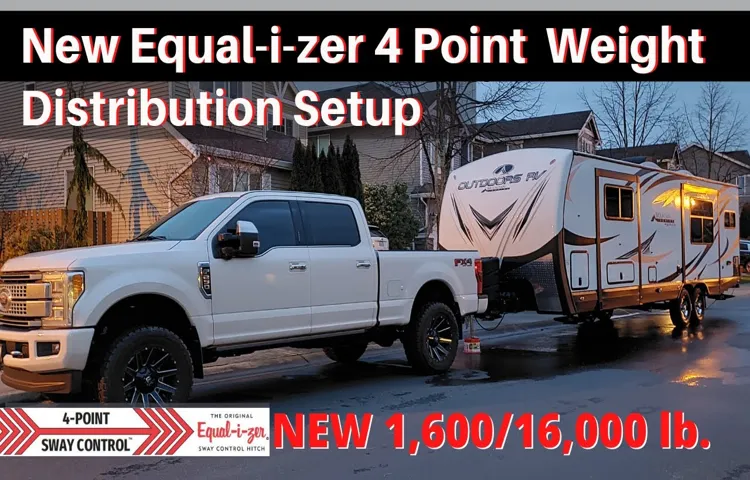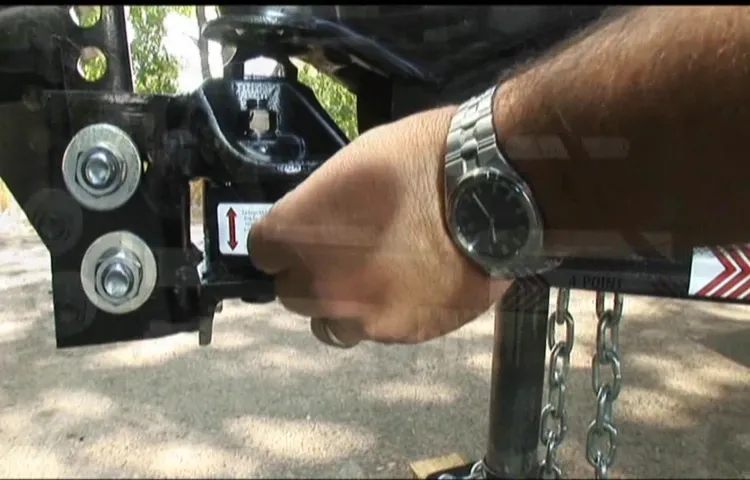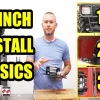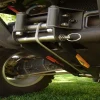Do you ever find yourself frustrated with the noise your equalizer hitch makes while towing your trailer? The constant clanking and rattling can be quite the annoyance, especially on long road trips. But fear not, because there are several simple steps you can take to quiet your equalizer hitch and enjoy a peaceful and smooth ride. In this blog post, we will explore some effective techniques for reducing noise and ensuring a quieter towing experience.
So, let’s dive in and discover how to silence that pesky equalizer hitch once and for all!
Table of Contents
Understanding the Noise from an Equalizer Hitch
If you’ve ever towed a trailer with an equalizer hitch, you may have noticed a lot of noise coming from the hitch. This noise can be quite annoying and distracting, not to mention a source of concern for some people. Fortunately, there are a few things you can do to quiet down your equalizer hitch and make your towing experience more enjoyable.
One of the most common causes of noise from an equalizer hitch is friction between the hitch components. This friction can be caused by a variety of factors, such as worn-out or improperly lubricated parts. To address this issue, make sure to regularly inspect your hitch and replace any worn-out parts.
Additionally, apply lubrication to the hitch components as recommended by the manufacturer. This will help reduce friction and minimize the noise. Another cause of noise from an equalizer hitch is improper weight distribution.
When the weight on your trailer is unevenly distributed, it can put extra strain on the hitch and cause it to make noise. To address this issue, make sure to properly load and balance your trailer before towing. Distribute the weight evenly from front to back and side to side.
This will help ensure that the weight is properly distributed and minimize any noise from the hitch. By taking these simple steps, you can significantly reduce the noise from your equalizer hitch and have a quieter, more enjoyable towing experience.
Common causes of noise
Common causes of noise often found in equalizer hitches can be frustrating to deal with, especially when you’re expecting a smooth and quiet ride. One of the most common causes of noise in an equalizer hitch is improper weight distribution. When the weight on your trailer is not properly distributed across the hitch and tow vehicle, it can lead to a noisy and bumpy ride.
Another common cause of noise is worn or damaged components. Over time, the components of an equalizer hitch can wear out or become damaged, leading to rattling and clunking sounds. Inspecting and replacing any worn or damaged parts can help alleviate these noises.
Finally, poor installation can also be a culprit when it comes to noise. If the equalizer hitch is not installed correctly, it can cause the hitch to bind or move around, resulting in noise. Ensuring that the hitch is properly installed and all components are securely fastened can help minimize noise and ensure a smoother ride.
By understanding these common causes of noise, you can take the necessary steps to address them and enjoy a quieter towing experience.

Effects of noise on towing experience
equalizer hitch, towing experience, noise, effects of noise
Importance of addressing the noise issue
Equalizer hitch noise is a common issue that many trailer owners face. Understanding the noise and how to address it is important for a smooth and enjoyable towing experience. Equalizer hitches are designed to distribute the weight of the trailer evenly between the tow vehicle and the trailer, reducing swaying and improving stability.
However, this can sometimes result in noise when turning or going over bumps. The noise is typically caused by friction between the hitch components, such as the spring bars and the L-shaped brackets. This friction produces a squeaking or creaking sound that can be quite loud and annoying.
To address the noise issue, there are a few things you can try. First, make sure that the hitch is properly lubricated. Applying a silicone-based lubricant to the friction points can reduce the noise significantly.
It’s also a good idea to check the tightness of all the bolts and nuts on the hitch. Loose or worn-out components can contribute to the noise problem. Additionally, consider using noise-dampening products, such as rubber pads or sleeves, to reduce friction and cushion the metal-on-metal contact.
By addressing the noise issue, you can enjoy a quieter and more comfortable towing experience. It’s important to regularly inspect and maintain your equalizer hitch to ensure optimal performance and to prevent any potential problems. Don’t let the noise from your hitch ruin your road trip – take the necessary steps to minimize it and enjoy a smoother ride.
Methods to Quiet an Equalizer Hitch
If you’re the proud owner of an equalizer hitch, you know that it can be a great tool for towing heavy loads, but it can also produce some annoying noise. The good news is that there are a few methods you can use to quiet your equalizer hitch and make your towing experience much more enjoyable. One of the easiest ways to quiet your hitch is by using lubrication.
Apply a generous amount of grease or silicone spray to the contact points on the hitch, such as the spring bars and ball mount. This will help to reduce friction and eliminate any squeaking or grinding sounds. Another method you can try is adjusting the tension on your hitch.
Sometimes, the noise is a result of the hitch being too loose or too tight. Experiment with different tension settings to find the sweet spot where the noise is minimized. Additionally, using rubberized pads or foam strips between the hitch components can also help to dampen vibrations and reduce noise.
So, don’t let a noisy equalizer hitch ruin your towing adventures. Try these methods to quiet your hitch and enjoy a smoother and quieter ride.
Inspect and lubricate the hitch components
Equalizer hitch, quiet, inspect, lubricate, components. If you want to have a smoother and quieter towing experience, it’s important to properly maintain and care for your equalizer hitch. One way to achieve this is by regularly inspecting and lubricating the hitch components.
This involves checking for any signs of wear or damage, such as rusty or worn out parts, and replacing them if necessary. Additionally, applying grease or lubricant to the moving parts of the hitch, such as the sway control bars and the hitch head, can help reduce friction and noise. By keeping your equalizer hitch in good condition and ensuring all the components are well-lubricated, you can enjoy a quieter and more stable towing experience.
Check the weight distribution and sway control settings
equalizer hitch. When it comes to towing a trailer, having a properly set up equalizer hitch is essential for a smooth and safe journey. However, even with a good hitch, you may still experience some unwanted noises and movements.
To minimize these issues and create a more pleasant towing experience, here are a few methods you can try. First, check the weight distribution of your trailer and make sure it’s properly balanced. Uneven weight distribution can cause swaying and noise.
Adjust the spring bars on your equalizer hitch to distribute the weight evenly between the tow vehicle and the trailer. Additionally, check the sway control settings on your hitch. Sway control is crucial for preventing side-to-side movement and instability.
Ensure that the sway control device is properly set up and functioning correctly. By properly balancing the weight distribution and fine-tuning the sway control on your equalizer hitch, you can eliminate a lot of the noise and movements that may be present during towing.
Use noise-reducing accessories
If you’re using an equalizer hitch for towing, one common issue you might encounter is noise. The clanking and rattling can be quite bothersome, but there are several methods you can try to quiet the hitch. One effective solution is to use noise-reducing accessories.
For example, you can invest in rubber or plastic hitch silencers that fit around the metal components of the hitch. These silencers help to dampen vibrations and reduce the noise produced during towing. Another option is to use noise-reducing lubricants on the moving parts of the hitch.
These lubricants create a barrier between the metal surfaces, reducing friction and minimizing noise. Additionally, you can also consider using padded hitch covers or wraps to further dampen the sound. By incorporating these noise-reducing accessories into your equalizer hitch setup, you can enjoy a much quieter towing experience.
Consider upgrading to a quieter hitch model
equalizer hitch, quieter, upgrade
Additional Tips for a Quieter Towing Experience
One of the most common concerns among RV enthusiasts is how to reduce the noise and vibrations caused by towing with an equalizer hitch. While these hitches are essential for distributing weight and providing stability, they can sometimes create an uncomfortable and noisy towing experience. Luckily, there are several tips and tricks to help quiet your equalizer hitch and improve your overall towing experience.
First, make sure that all the components of your hitch are properly lubricated. Applying grease to the pivot points and friction areas can significantly reduce noise and vibrations. Secondly, consider investing in additional dampening devices or accessories specifically designed to reduce noise and vibrations in towing setups.
Products like hitch silencers and sway control pads are worth considering for a quieter towing experience. Finally, check and tighten all the bolts and fasteners on your equalizer hitch regularly. Loose components can cause rattling and noise, so ensuring everything is properly tightened can make a significant difference.
With these additional tips, you can enjoy a quieter and more comfortable towing experience with your equalizer hitch.
Drive at a moderate speed
One important tip to consider for a quieter towing experience is to drive at a moderate speed. When towing a trailer, it’s important to remember that the extra weight behind your vehicle can affect its stability and handling. Driving at a moderate speed allows you to maintain control and reduce the amount of noise generated by your vehicle.
It also gives you more time to react to any unexpected road conditions or obstacles that may come your way. By driving at a moderate speed, you can ensure a smoother and quieter towing experience for yourself and other drivers on the road. So, take your time and enjoy the journey, rather than rushing to your destination and compromising safety and peace of mind.
Avoid rough roads and potholes
If you want to have a quieter towing experience, it’s important to avoid rough roads and potholes. These road conditions can not only damage your vehicle but also create a bumpy and noisy ride. When you tow a trailer or another vehicle, any irregularities on the road can be exaggerated, making the journey uncomfortable and noisy.
By avoiding rough roads and potholes, you can minimize the shaking and vibrations that can lead to unwanted noise. Plan your route ahead of time and choose roads that are in good condition. If you come across a pothole or rough patch, slow down and navigate around it carefully.
Taking these precautions will help ensure a smoother and quieter towing experience.
Regularly inspect and maintain the hitch system
One important aspect of towing that is often overlooked is the inspection and maintenance of the hitch system. This is crucial for ensuring a quieter and smoother towing experience. Regularly inspecting the hitch system will allow you to identify any worn-out or damaged parts that might be causing noise or vibrations while towing.
Check the hitch ball, receiver, coupler, and safety chains for any signs of wear and tear. Additionally, make sure to lubricate the hitch ball and receiver to reduce friction and noise. Keeping the hitch system well-maintained will not only contribute to a quieter towing experience but also enhance safety and prolong the lifespan of the towing equipment.
So, don’t forget to give your hitch system a little TLC before hitting the road.
Conclusion
In conclusion, taming the wild beast known as an equalizer hitch is no easy task. It requires a delicate balance of strength and finesse, much like taming a lion with a feather. But fear not, my friends, for with the proper tools and techniques, you can quiet this creature and restore peace to your towing adventures.
First, equip yourself with the necessary gear: a sturdy wrench, a can of lubricant, and a pocketful of patience. Approach your equalizer hitch cautiously, as if approaching a sleeping dragon. Give it a gentle tap with the wrench, whispering sweet nothings into its ear, and try not to awaken its wrath.
Next, apply the lubricant generously to the pivot points and sway control mechanisms. This will not only hush the creaking and groaning, but also provide a soothing massage to the restless parts. Show your equalizer hitch some love and watch as it quickly succumbs to the relaxation.
Now comes the crucial step: adjusting the weight distribution. It’s a delicate dance, my friends, one that requires precision and finesse. Grab the handle of the hitch, not too tight and not too loose, and give it a gentle shake.
Let it know who’s in control here. As you do this, listen closely for any signs of protest – a squeak, a shriek, or a grumble. Adjust the weight distribution accordingly, redistributing the tension like a master puppeteer.
Finally, take a step back and admire your handiwork. The once noisy and wild equalizer hitch now stands silently, as if it was never there at all. You have tamed the beast, my friend, and it bows down to your greatness.
FAQs
What is an equalizer hitch used for?
An equalizer hitch is used to distribute the weight of a trailer evenly across the towing vehicle, providing greater stability and control while towing.
How does an equalizer hitch work?
An equalizer hitch works by using spring bars and tension to distribute the weight of a trailer across the towing vehicle’s axles. This helps to reduce trailer sway and improve overall towing performance.
What are the benefits of using an equalizer hitch?
Using an equalizer hitch can provide several benefits, including improved towing stability, reduced trailer sway, and a smoother ride. It can also help to minimize wear and tear on both the towing vehicle and the trailer.
How do I choose the right equalizer hitch for my trailer?
When choosing an equalizer hitch, you should consider factors such as the trailer’s weight, tongue weight, and the towing vehicle’s towing capacity. It’s also important to choose a hitch that is compatible with your trailer’s hitch receiver.
How do I properly set up an equalizer hitch?
To properly set up an equalizer hitch, you should start by measuring and adjusting the hitch height to ensure it is level with the trailer’s coupler. Then, you should connect the spring bars and apply tension according to the manufacturer’s instructions. Finally, you should perform a test drive and make any necessary adjustments to achieve optimal towing performance.
Can I use an equalizer hitch with any type of trailer?
Equalizer hitches are designed to work with a variety of trailer types, including travel trailers, camping trailers, and utility trailers. However, it’s important to check the weight and compatibility requirements of the specific hitch you are considering to ensure it is suitable for your trailer.
Are equalizer hitches difficult to install and use?
The installation and use of an equalizer hitch can vary depending on the specific hitch and trailer combination. However, most modern equalizer hitches come with detailed instructions and are relatively easy to install and use with some basic knowledge and tools. It’s important to read and follow the manufacturer’s instructions carefully for proper installation and usage.



